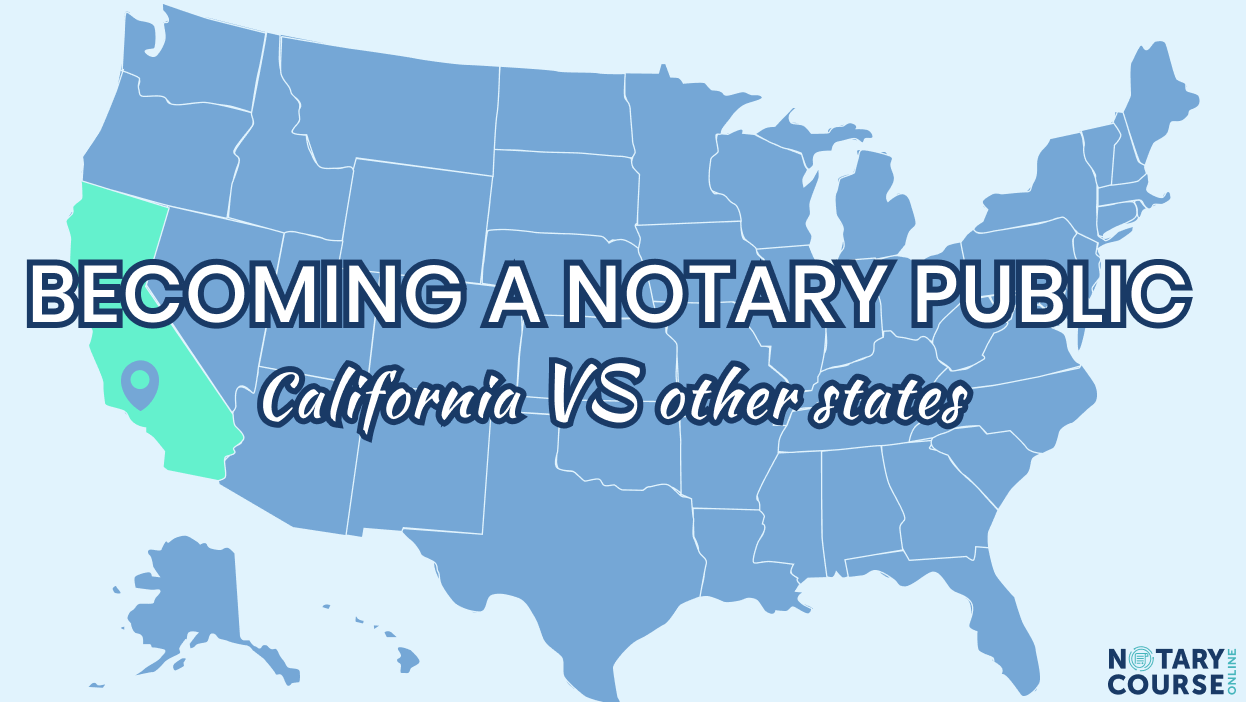California
Blog
The Advantages of Becoming a Notary Public in California vs. Other US States

-
by Notary Course Online
- September 25, 2023
Becoming a notary public can be a lucrative and rewarding career choice with many benefits. However, each state in the United States has its unique requirements and regulations for becoming a notary. If you want to become a notary public in California, or in any other state , it’s important to understand the similarities and differences between each state’s requirements, costs, examination, commission validity, and potential income.
In this article, we’ll compare the process of becoming a notary public in California and other states, including Arizona, Utah, Oregon, and Nevada. We’ll take look at the requirements for becoming a notary in each state. You’ll learn which notary public course you need to take and how to prepare for the state notary exam. We’ll also compare the costs of becoming a notary in each state: the cost for notary courses, the application, examination, and activation of your notary public commission. Our guide will help you decide whether becoming a notary public in California is the right choice for you.
Table of Contents
- How much money do notaries public make?
- What are the requirements to become a notary public?
- How long does it take to become a notary public?
- How much does it cost to become a notary public?
- How long is a notary public commission valid?
- Why is it worth becoming a notary public in California?
How much money do notaries public make?
Exactly how much a notary public makes will depend on how long you’ve been working in the field, how many clients you regularly work with and what amount you charge. Your income will likely go up as you acquire more experience and better reputation.
In California:
The answer to how much notaries public make in California falls between $43,214 and $56,267 per year as of December 2022, according to Salary.com. As a rule, notaries in California can charge $15 per notarial act.
In other states:
Notaries can charge only $10 in Florida, Arizona, Michigan, and some other states. In still other states, no maximum notary fee is set by law, so local competition sets the mid-market price.
Ultimately, how much notaries make will depend on their working activity and market demand in a specific state.
What are the requirements to become a notary public?
In California:
To become a notary public in California you must meet certain requirements:
- Be at least 18 years old
- Be a legal resident of California
- Complete a state-approved notary education course (6 hours) within the last six months
- Pass a state-administered exam
- Pass a background check
- Obtain a $15,000 surety bond
- Submit an application and pay the required fees
Notary applicants in California must take either a 6-hour notary course or a 3-hour refresher notary course
6-Hour Notary Course:
The 6-hour notary course is required for new notary applicants, no matter how many approved notary commission terms they had before. The online class covers the basics of the notary public practice, including the duties and responsibilities of a notary, as well as rules and regulations.
3-Hour Refresher Notary Course:
The 3-hour refresher notary course is required for all notaries public who apply for commission renewal before their current one has expired. Only previously commissioned notaries public are allowed to take the 3-hour course. During the 3-hour online class, notaries public get updated on all actual changes to legislation acts, notary rules, and regulations that occurred since their last commission was issued.
The requirements to become a notary public in other states are similar to those in California. However, it is necessary to draw attention to several differences
In Oregon:
Must be at least 18 years old, be a legal resident of Oregon, complete a state-approved notary education course (6 hours), pass a state-administered exam, and pass a background check. Oregon does not require its notaries public to be bonded.
In Nevada:
Must be at least 18 years old, be a legal resident of Nevada, complete a state-approved notary education course (3 hours), pass a state-administered exam, pass a background check, and obtain a $10,000 surety bond.
In Arizona:
Must be at least 18 years old, be a legal resident of Arizona, complete a state-approved notary education course (3 hours), pass a state-administered exam, pass a background check, and obtain a $5,000 surety bond.
In Utah:
Must be at least 18 years old, be a legal resident of Utah, complete a state-approved notary education course (3 hours), pass a state-administered exam, pass a background check, and obtain a $5,000 surety bond.
How long does it take to become a notary public?
In California:
The process of becoming a notary public typically takes between six and eight weeks. This includes all the processes, from submitting the application and completing the required education course to passing the state notary exam andreceiving the commission certificate.
In other states:
In Oregon, Nevada, Arizona, and Itah, the process takes four to six weeks.
Timeframes include submitting an application, completing a notary education course, and passing a state-administered exam.
How much does it cost to become a notary public?
In California:
To become a notary public in California you’ll need to pay $40 for the application fee, $40 for the exam fee, and up to $80 for the required notary public education course. The total cost, therefore, could be up to $160, depending on the cost of the education course. The cost of an online notary course in California starts from as low as 24.99 $, and live seminars range from $100 to $200. Read more about how to choose a state-approved notary class for you. Also, don’t forget about required notary public supplies, so you can perform notarization acts and check or confirm signers’ identity.
In other states:
The cost for becoming a notary in Arizona is around $120, in Utah is around $100, in Oregon is around $90, while the cost for becoming a notary in Washington is around $130. The costs include both application and exam fees.
How long is a notary public commission valid?
In California:
A notary public commission is valid for four years from the date of issuance. However, you have to keep in mind taking a 3 hour refresher notary course to prepare for the California notary public re-commissioning exam.
In other states:
Oregon, Nevada, Arizona, and Utah have the same rules. Notary public commission is valid for four years from the date of issuance.
Why is it worth becoming a notary public in California?
Without a doubt, becoming a notary public in California is a great way to make more money. It also offers numerous other benefits such as social connections, expanding your professional skills, and providing a valuable service to your community. These are some advantages of becoming a CA notary:
1. Earning Potential:
California notaries have one of the highest commission fees in the country, currently set at $15 per notarization. Moreover, California notaries are allowed to charge their clients for certain travel fees and other related expenses.
2. High Demand:
With a population of over 39 million people, California has a significant need for notary services, especially in major cities like Los Angeles and San Francisco. This means that there may be more opportunities for California notaries to find work, build a client base, and develop their business.
3. Diverse Clientele:
California is known for its diverse population, and this can be an advantage for notaries who are bilingual or multilingual. By communicating with clients in various languages, California notaries are enabled to serve a wider range of clients and expand their customer base.
4. Longer Commission Terms:
In California, notary public commissions are valid for four years, which is longer than the commission terms in some other states. This means that California notaries may have more stability and continuity in their work, as they do not have to renew their commission too often.
Summary
Becoming a notary public in California offers numerous advantages. Firstly, it expands career opportunities as many industries require notarized documents. It boosts professional profiles and employability.
Secondly, it provides an opportunity for additional income through charging fees for services.
If you decide to start your notary public career, Notary Course Online will help you through your journey from taking 6 hour notary course to choosing the required notary supplies. Our education center offers certified notary courses created with the primary focus on a seamless and efficient learning experience, ensuring that you pass your exam with outstanding results.






 Congratulations!
Congratulations!